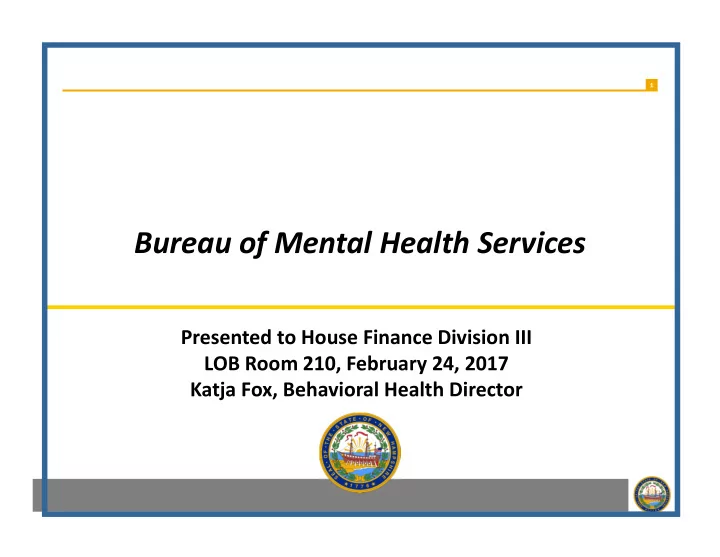

� Bureau of Mental Health Services Presented to House Finance Division III LOB Room 210, February 24, 2017 Katja Fox, Behavioral Health Director
Agenda � � Overview Bureau of Mental Health Services � Key Programs / Services � Population Served � Delivery System � Financial Summary � Accomplishments � Key Challenges
Overview – Bureau of Mental Health Services � � Works to ensure the provision of efficient and effective services to those citizens who have a severe mental illness (SMI) or severe and persistent mentally illness (SPMI) as defined by NH laws and rules. � Oversees the service delivery system for the SMI/SPMI population, including: Community Mental Health Centers; Peer Support Agencies; a Family Mutual Support Organization; Transitional Housing Program; Guardianship Services and other federal identified priorities. � Works with the Bureaus of Children’s Behavioral Health, Drug and Alcohol Services, New Hampshire Hospital, Glencliff Home and community providers to enhance the behavioral health service delivery system of adults and older adults. � Works to ensure the objectives of the Community Mental Health Agreement (CMHA) are achieved.
Types of Clients and Services � Community Mental Health Services include: clinical assessment and diagnostic evaluations; emergency services; individual, family and group therapies; functional support services; targeted case management; community residences; housing subsidy services and psychiatric services including medication management. Client Eligibility: Adults and Older Adults served through the Community Mental Health Programs Community Mental Health Agreement Services addressed: Assertive Community Treatment Teams; Supported Housing and Services; Community Residence development; Evidenced Based Supportive Employment; Peer Support Services; and Family Mutual Support. Client Eligibility: Adults and Older Adults served through the Community Mental Health Programs Peer Support Services include supportive interactions based on shared experience designed to assist people in there recovery. Services are provided by peers and focus on choice using non-medical approaches in shared decision making and encouraging informed decision making about all aspects of people’s lives. Client Eligibility: Adults and Older Adults with a mental illness
Types of Funding � Mental Health Block Grant Services include: Block Grant funding supports Peer Support Agencies; 1 Program Planning and Review Specialist; and children’s evidenced based practices including First Episode Psychosis (FEP) and Modular Approach to Therapy for Children with Anxiety, Trauma, or Conduct Problems (MATCH) Client Eligibility: Adults and Older Adults with Mental Illness and Children with a Severe Emotional Disturbance CMH Program Support Services include: Supports for non-Medicaid funded community mental health services, such as emergency services for uninsured individuals; an uncompensated care fund for the Cypress Center (a 16-bed Acute Psychiatric Residential Treatment Program); statewide Deaf services for CMHC served clients; an 8-bed transitional housing site; and the Housing Bridge Subsidy program. Client Eligibility: Adults and Older Adults with a mental illness Guardianship Services Services include: Two contracted agencies, Tri-County Community Action Program and Office of Public Guardian, provide guardianship services in accordance with RSA 135-C:60 and RSA 171-A:10, II. Client Eligibility: Individuals over the age of 18 who lack the capacity to manage their own affairs and who are at risk of substantial harm to their person or estate, when no other less restrictive alternative is available.
Populations � SFY CMHC CMHC CMHC Peer Guardianship SMI SPMI LU * Support Low Utilizer: Has a mental illness but no longer meets all the criteria for SPMI or SMI and receives services that are designed to prevent relapse 2015 4,234 5,843 707 2,096 100 2016 4,395 6,204 791 3,051 140 2017 year 3,716 6,266 715 2,115 103 to date
Delivery System � Providers Type of Provider Delivery System 1. Community Supported by Medicaid and General Funds (GFs), Mental Health Community Mental Health Contracts with DHHS Centers (10) Supported by Block Grant and General Funds 2. Peer Support Mental Health Peer Support Agencies (10) Contracts with DHHS Medicaid Provider Community Mental Health General Funds for Housing Bridge Subsidy 3. Harbor Homes Housing supports Program Contract with DHHS 4. North American Community Mental Health Family Institute Contract with DHHS Housing supports (NFI) 5. National Alliance Family Mutual Support on Mental Illness Contract with DHHS Organization (NAMI-NH)
Major Spend Major Spend – Bureau of Mental Health Services � Salaries/Benefits 4% Operations 2% Contracts 94% Total SFY 16 SFY 17 Adjusted SFY 18 SFY 19 Actual Authorized Governor’s Governor’s Budget Budget BMHS Total Funds $18.4 $20.8 $24.9 $24.9 BMHS General $15.2 $16.2 $20.4 $20.4 Funds Amounts in Millions
Major Accounting Units – General Funds � Major Accounting SFY16 Actual SFY 17 Adjusted SFY18 Governor’s SFY19 Governor’s Unit Authorized Request Request 9220-4114 $1.3 $1.4 $1.4 $1.4 Guardianship Services 9220-4117 $11.8 $12.3 $16.5 $16.6 CMH Program Support 9220-4118 $1.0 $1.2 $1.2 $1.2 Peer Support Services 9220-4120 $0 $0 $0 $0 Mental Health Block Grant Amounts are General Funds only and in Millions
Staffing – Bureau of Mental Health Services �� Authorized Positions Accounting Unit Vacant SFY18 8 CMH Program Support 1 2 Office of Consumer & Family Affairs 1 1 Mental Health Block Grant 0 11 Total 2
Key Accomplishments �� Implemented 2 Mobile Crisis Teams and crisis apartments in the State Transitioned Glencliff Home residents into community-based settings Increased placement of individuals with SMI/SPMI in supportive housing Increased number of individuals in Supportive Employment services
Major Challenges �� Provider capacity/workforce Implementation of certain components of the Community Mental Health Agreement Ongoing Emergency Department Utilization for individuals who are experiencing psychiatric crises Capacity to serve individuals with SMI/SPMI with complex needs, including; but not limited to: individuals with criminal justice involvement; dually-diagnosed with behavioral health and intellectual developmental disabilities; and individuals with co-occurring mental health and substance use disorders.
Recommend
More recommend